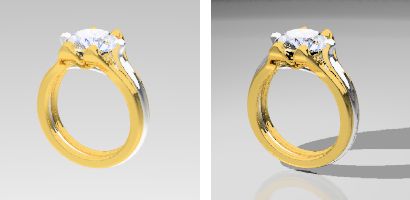![]()
Window
Floating Panels >
Show Ground Plane Panel
Ground Plane
| Toolbar | Menu | Panel Gear Menu |
|---|---|---|
|
|
Window Floating Panels > |
Ground Plane |
The GroundPlane command opens the Ground Plane panel.
The ground plane provides an infinite horizontal platform for the image that stretches to the horizon in all directions positioned at a defined elevation. A ground plane renders much faster than using a surface as a background. Any material can be assigned to the ground plane.
The ground plane does not display in Technical or Wireframe display modes.

![]() Ground Plane Panel
Ground Plane Panel
Turns on the ground plane.
Allows the "back" of the ground plane to be visible when viewed from below. Otherwise, the underside is transparent
Sets the ground plane's height above the xy plane.
Turns on auto-elevation that moves Ground Plane to the lowest point of the objects in the model. New objects added to the scene may change Ground Plane elevation. Auto-elevation ignores non-meshable* object types.
*Non-meshable object types do not generate render meshes. For examples, curves, dimensions, texture mapping widgets, etc.
Makes the ground plane transparent, but allows shadows to still be cast on it.
Assigns a material to the ground plane and edits the material. For information on setting a material, see Materials.
These settings apply when a texture applied to the ground plane.
Specifies the offset distance in units from 0,0,0.
Specifies the size in units of the texture.
Specifies the rotation angle of the texture from 0.
| Command-line options | |
|---|---|
|
ShowPanel |
OptionsOnShowUnderside=Off/OnAutomaticAltitude=Off/OnShadowOnly=Off/OnAltitude=0SetMaterialInstance ID or Instance name |
Render the objects using the current renderer.
GroundPlane in the Rhino 6 render display
Rhino 6 for Mac © 2010-2020 Robert McNeel & Associates. 11-Nov-2020